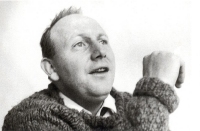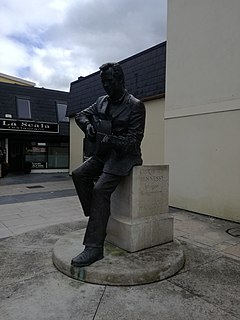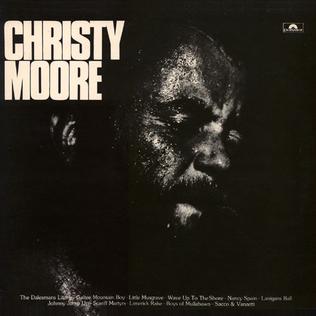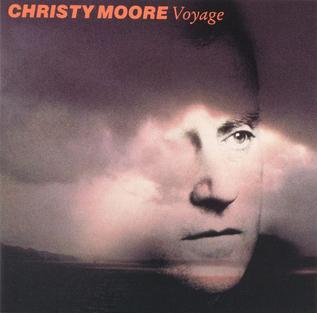
"The Wreck of the Edmund Fitzgerald" is a 1976 hit song written, composed and performed by Canadian singer-songwriter Gordon Lightfoot to commemorate the sinking of the bulk carrier SS Edmund Fitzgerald on Lake Superior on November 10, 1975. Lightfoot drew his inspiration from Newsweek's article on the event, "The Cruelest Month", which it published in its November 24, 1975, issue. Lightfoot considers this song to be his finest work.

Luke Kelly was an Irish singer, folk musician and actor from Dublin, Ireland. Born into a working-class household in Dublin city, Kelly moved to England in his late teens and by his early 20s had become involved in a folk music revival. Returning to Dublin in the 1960s, he is noted as a founding member of the band The Dubliners in 1962. Known for his distinctive singing style, and sometimes political messages, the Irish Post and other commentators have regarded Kelly as one of Ireland's greatest folk singers.

Christopher Andrew "Christy" Moore is an Irish folk singer, songwriter and guitarist. He is one of the founding members of Planxty and Moving Hearts. His first album, Paddy on the Road was recorded with Dominic Behan in 1969. In 2007, he was named as Ireland's greatest living musician in RTÉ's People of the Year Awards.

Ride On is an album by Irish folk singer Christy Moore, released in 1984. Its title track remains one of his most popular songs. A number of songs relate the actions of those involved in political struggles, or those affected by those struggles; such as "Viva la Quinte Brigada" which is concerned with the Irish contingent amongst the International Brigade in the Spanish Civil War; or "El Salvador" dealing with the civil war in that country in the 1980s. Other songs deal with Irish history – "The City of Chicago", about emigration to America during the Irish famines of the late 1840s; "Back Home in Derry" written by Bobby Sands about the transportation to Australia of convicts; and "Lisdoonvarna" celebrating a music festival that took place annually in that town until the early 1980s.

Dónal Lunny is an Irish folk musician and producer. He plays left-handed guitar and bouzouki, as well as keyboards and bodhrán. As a founding member of popular bands Planxty, The Bothy Band, Moving Hearts, Coolfin, Mozaik, LAPD, and Usher's Island, he has been at the forefront of the renaissance of Irish traditional music for over five decades.
Christy Brown was an Irish writer and painter who had cerebral palsy and was able to write or type only with the toes of one foot. His most recognized work is his autobiography, titled My Left Foot (1954). It was later made into a 1989 Academy Award-winning film of the same name, starring Daniel Day-Lewis as Brown.
Voyage(s) or The Voyage may refer to:

Frank Harte was a traditional Irish singer, song collector, architect and lecturer. He was born in Chapelizod, County Dublin, and raised in Dublin. His father, Peter Harte, who had moved from a farming background in Sligo, owned 'The Tap' pub in Chapelizod.

Christie Hennessy was an Irish folk singer-songwriter. Although Hennessy was unable to read or write due to severe dyslexia, he still wrote his own songs such as "Roll Back the Clouds" and "All the Lies That You Told Me".

Wild Frontier is the sixth solo studio album by Northern Irish guitarist Gary Moore, released in 1987. His first studio effort after a trip back to his native Belfast, Northern Ireland, in 1985, the album contains several songs about Ireland and the music itself is steeped in Celtic roots. The album is dedicated to the memory of Moore's close friend and former Thin Lizzy bandmate Phil Lynott, who died on 4 January 1986, with the words "For Philip" on the rear cover.
The Irish folk song "Mursheen Durkin" tells the story of an emigrant from Ireland who goes to mine for gold in California during the California Gold Rush, 1849. The song is about emigration, although atypically optimistic for the genre. The name "Muirsheen" is a good phonetic approximation to the pronunciation of "Máirtín" (Martin) in Connacht Irish; it could alternatively be construed as a diminutive of "Muiris" (Maurice). A pratie is a potato, the historical staple crop of Ireland. "America" is pronounced "Americay", as was common among Gaelic peoples around Ireland.

John "Jacko" Reilly, (1926–1969) was a traditional Irish singer. He was a settled Irish Traveller who lived in Boyle, County Roscommon, but hailed originally from Carrick-on-Shannon in County Leitrim. He was a profound influence on many popular folk and traditional singers, based largely on recordings of his singing by the Irish song collector Tom Munnelly which were however not released until after his early death in 1969 at the age of 44.

Ordinary Man is the tenth studio album by Irish folk artist, Christy Moore. It features songs like "Ordinary Man", "St. Brendan's Voyage" and "Another Song is Born". The album featured songs by Peter Hames, Johnny Mulhearn, Hugh McDonald, Colm Gallagher and Floyd Red Crow Westerman; as well as some backing vocals by Enya on "Quiet Desperation", "Sweet Music Roll On" and "The Diamondtina [sic] Drover" and some fine uilleann pipes work by Liam O'Flynn.

Johnny Duhan started his career as a fifteen-year-old front man in the Limerick beat group Granny’s Intentions. After achieving some success in Dublin, they moved to London and were signed to the Decca/Deram record label, releasing several singles and one album, Honest Injun. However, the band disbanded before Duhan was twenty one. Despite offers to front other bands, Duhan turned his back on the popular music industry and started writing folk songs, poetry and prose. He has condensed his various works over 40 years into a quartet of albums: Just Another Town, To The Light, The Voyage and Flame. These correspond with the four chapters of his lyrical autobiography, To The Light. His songs have achieved notability, largely thanks to the focus put on them by Christy Moore, The Dubliners, Mary Black and many other Irish and international singers. The Duhan song "The Voyage" has become a modern classic. Christy Moore stated that "The Voyage" has been performed at over a million weddings worldwide.

Christy Moore is the fourth solo album by Irish folk musician Christy Moore, released in 1976.
"The Voyage" is a very famous modern Irish classic song by the Irish musician, singer-songwriter Johnny Duhan. Unsure of his own vocal capabilities, he offered it to the Irish singer Christy Moore who recorded a version in 1989 that became the definitive and most well-known version of the song. Johnny Duhan went on to record his own version for his similarly titled album The Voyage that was released much later in 2005. The song has been interpreted by a great number of artists and translated into other languages

Voyage is an Irish folk music album by Christy Moore. The album features songs of a political nature, however unlike Moore's past releases, the subjects aren't limited to Ireland specific issues. Sinéad O'Connor sings "Middle of the Island" with Moore.
Where I Come From is a 3 disc album by Irish folk singer Christy Moore, released in 2013 by Columbia Records. The album features a number of new compositions as well as re-recordings of past songs.

Between the Jigs and the Reels: A Retrospective is a two-disc anthology by the Irish folk band Planxty. It includes a 17-track CD and a 36-track DVD with over two hours of previously unreleased footage (1972–1982) from RTÉ archives.













